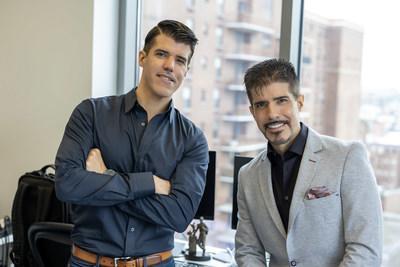Twin Brothers Building a FinTech Venture: Stephen Roche and Gabino Roche, CoFounders of Saphyre (Part 1)

Gabino and Stephen have built a wonderful FinTech company and tell their story with wonderful flair and candor.
Sramana Mitra: Let’s go to the very beginning of your journey. Where were you from? Where were you born, raised, and in what kind of background? You are twin brothers. I think this is my first case study of a twin-brother entrepreneur.
Gabino Roche: My brother and I are Cuban. We’re the first generation here in the US. Our parents are both from Cuba and met here in the US. Both grandparents and our father were entrepreneurs. My father’s father had his own business here in the US. They always talked about us having our own business. For most of our careers, Stephen and I had worked in corporate jobs. I worked at a number of companies mostly in business analysis and technology and bridging the gap between business and technology.
I will say that McKinsey was looking for industry experience with these corporations, maybe some startup experience to help deliver software products faster. They had put me in touch with a ton of thought leaders in the agile and user experience design space. I’m very grateful for that because it created lightbulbs and epiphanies to sharpen my skills.
At that time, I jumped over to the finance industry. It was something I always wanted to explore in applying that business technology background to finance. I was at the NYSE at the height of the financial crisis in a startup division trying to teach a finance company how to be a technology company.
Then I went over to JP Morgan. They had me sit in their business operations overseeing technology solutions being rolled out to support their clients. I started really understanding how the finance industry worked. I helped streamline some of the operations at the bank. Some of the management at JP Morgan asked me to help rescue a startup consortium that they’ve invested in. There were multiple big-name banks. They spent over a hundred million dollars and they didn’t have a finalized product.
The beauty of that was that the team I had put together learned what major banks were doing in the space and what clients needed. I was afraid to take it because I had the safety net of working at JP Morgan. They had been very good to me. It was my brother who said, “You should really explore this. You might be able to invent something that’s going to change the finance industry and you can deploy it.” That’s where the kernel was for Saphyre.
One other piece that I forgot to mention was while I was at NYSE, the smartphone industry was kicking off. I had three failed businesses and one that broke even. I was trying to do consulting in different industries. I didn’t want to be a slave to any company, but I wanted to explore the entrepreneur route in a safe way.
One year, one of my businesses lost $80,000. If you are professionally mature, you will learn so much more from that experience than you would have at Harvard. During that time, I had a mobile app business. JP Morgan allowed me to do it so long as I didn’t do anything in finance. The reason why I bring this up is there’s the freedom of failure that is missing with entrepreneurs. They only hear good stories. They don’t know that there are these dark times. Six times, Saphyre almost went bankrupt.
Sramana Mitra: You’re making a very important point. We have a track in One Million by One Million called Bootstrapping with a Paycheck for exactly the reason that you’re pointing out. We don’t want the entrepreneurs who are starting companies as side gigs to quit their jobs until they have some level of validation. You still have to pay the bills. It’s a long way from starting a company to getting any kind of outside financing.
You have to get a lot of validation before anybody is going to write checks. Your friends and family might write checks, but any professional investor is going to write checks only after you have a significant level of validation. Unless you have a way of paying the bills, you are going to be out on your own.
The freedom to failure that you’re describing is a really important window. It is that freedom to fail is best handled in a Bootstrapping with a Paycheck mode.
Gabino Roche: I’m glad you do that. I will say that when you fail, it’s not like you give up.
This segment is part 1 in the series : Twin Brothers Building a FinTech Venture: Stephen Roche and Gabino Roche, CoFounders of Saphyre
1 2 3 4 5 6 7
Featured Videos
Can 1M/1M Help Me Raise Money?
How Does 1M/1M Democratize Entrepreneurship Education?
How Does 1M/1M Democratize Management Consulting?
When Is The Right Time To Join 1M/1M?
Can 1M/1M Help Me With Business Development?
Can 1M/1M Help Me With Market Sizing?
Can 1M/1M Help Me Validate My Product?
Will I Have Private 1-on-1 Sessions In 1M/1M?
How Does 1M/1M Help Entrepreneurs Connect With Silicon Valley?
Mentoring or Consulting?
Why Does 1M/1M Charge $1000 a Year?
Why Does 1M/1M Partner With Local Organizations?
Why Don\’t Mentoring Networks Work?
Why Is It Important To Study With 1M/1M Now?
Dan Stewart Story
Vikrant Mathur Story
